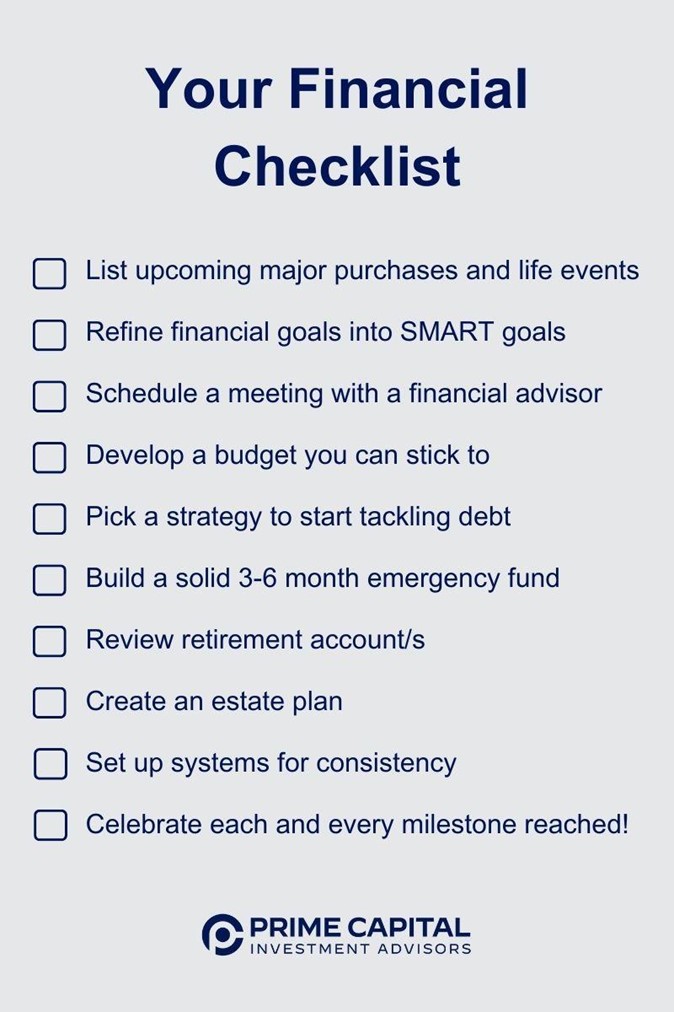Major stock indices may be hovering around their all-time highs, but your personal finances might not reflect the same optimism. Inflation is still exceeding the Federal Reserve’s 2% target and interest rate cuts remain off in the distance. The dislocations in the market present a sound reason to examine your spending, reassess goals, and ensure your savings and investments are keeping pace with the times. A personal financial checkup allows you to understand your current situation and make any necessary adjustments to keep your finances on track.
Managing your finances is a marathon, not a sprint. Developing healthy financial habits including regular assessments of your financial well-being and having an advisor to collaborate with can help you stay on track and ultimately, create and enjoy the life you envisioned.
Keep reading to learn how to evaluate your finances and take actionable steps to properly set goals while preparing for any potential challenges. We also created a simple checklist you can download so you are able to monitor your progress. Together, we can navigate the complexities of money management and work toward achieving your goals.
Evaluating Your Finances and Planning for the Future
- Assess and Reflect: Begin by evaluating your current financial situation. Consider significant upcoming purchases and life events, and how you can optimize your debt and savings strategies. This foundational step is crucial for developing a personalized financial plan that resonates with your life’s ambitions and challenges. This may be the toughest step, because it means being brutally honest with yourself!
- Embrace Change: Life is unpredictable. Transitions like marriage, parenthood, career shifts, divorce, and more necessitate a recalibration of your financial goals. Stay agile by updating your emergency fund, insurance, and retirement plans to reflect these new realities.
- Set SMART Goals: Clarity is your ally in financial planning. Embrace the SMART framework to outline your objectives:
- Specific: Define clear, concrete goals.
- Measurable: Ensure your progress is quantifiable.
- Achievable: Set realistic targets based on your resources.
- Relevant: Make sure your objectives are aligned with your core values.
- Time-bound: Establish firm deadlines to foster accountability.
- Find a Financial Advisor: Collaborate with our advisors to tailor your SMART goals to your unique situation. We will help to ensure your financial plan is balanced, achievable, and attuned to your needs.
- Prepare for Hardship: Prioritize building a 3-6 month emergency fund. This safety net empowers you to pursue goals, such as debt reduction or retirement savings, with confidence.
- Implement and Celebrate: Establish systems to maintain consistency in achieving your goals. Whether it’s automating savings, scheduling regular financial reviews, or leveraging technology like budgeting apps, find what works for you. And remember to celebrate each milestone reached!
Keep a reminder of your commitment to your future financial success with you! We’ve created an easy-to-follow checklist below. It can serve as your roadmap through your financial landscape and remind you of the little things you can do to make a big impact for your future self. We are committed to guiding you at every turn, helping to ensure your path leads to security and prosperity.
Download this Financial Checklist by clicking on the image.
- Alphabet stock pullback a buying opportunity - July 25, 2024
- Prime Capital Investment Advisors Welcomes James Burton as Independent Director of Advisory Board - July 15, 2024
- How Tax Planning Differs For Young Clients - July 15, 2024


